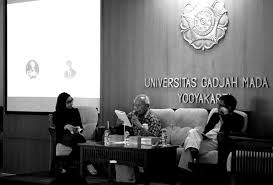
The South China Sea Dispute to this day still leaves various problems. Indonesia is not a country involved in this dispute, but the background of Indonesia’s position as a country that is often considered to be able to stand neutral in the midst of such problems, makes this country as if it has an obligation to place itself in resolving the dispute. Some other reasons behind the involvement of Indonesia in the settlement of the dispute is due to several things. Firstly, the increasingly protracted problem is feared will affect the stability of the relations of countries in Southeast Asia. No improvement in the condition of this dispute has the potential to hamper the export of natural resources and other economic activities. On the other hand, Indonesia can show its image as a responsible regional leader by taking a role in the settlement of this dispute. Without the impetus to be able to reach the settlement of this dispute by the Indonesian side, will certainly reduce the image of Indonesia itself.
Territorial disputes are often long-standing and tough because they relate to the core of a country’s sovereignty, but that does not mean it can not be resolved. First, even though territory is at the core of the sovereignty of a state, the change of territory does not and the life of a nation is dead. Moreover, in this dispute, no one “loses” the territory because indeed the boundaries of the area have not been agreed upon since the beginning. If in the process, a country has to surrender the claimed territory, it does not mean the country is losing it, but that is part of the boundary-making process. Secondly, there have been many precedents that territorial disputes can be resolved peacefully. Belief in this fact is important to the disputing parties as well as those who want to contribute like Indonesia because if basically Indonesia does not believe or is pessimistic, it will affect the course of the diplomacy process.
Resolving disputes peacefully is often not only purely a question of law. The stability of territorial disputes is also influenced by the value (salience) contained in the territory and also the visibility of disputes in the eyes of the domestic audience. Pragmatically, many disputes can be resolved peacefully when the process of dispute is not witnessed by the public which usually has a sentiment of nationalism against any small territory. Similarly, the tough position of a country is often not based on the economic and security interests of the country, but also the legitimacy of the regime in power in front of its people. This is also a factor for Indonesia to consider in terms of the position of disputing countries and in designing its diplomatic form.
One form of dispute resolution program in the South China Sea region initiated by Indonesia is through WMPC SCS (Workshop on Managing Potential Conflict in the South China Sea). The program was initiated by prof. DR. Hasyim Djalal (Former Ambassador of the Republic of Indonesia to the United Nations) in an effort to dampen and resolve the dispute. This effort can be categorized as a form of second track diplomacy of the South China Sea Dispute Settlement and is another line after bilateral settlement between disputing countries, in this case China, Vietnam, Malaysia and the Philippines.
This is behind the research initiated through cooperation between BPPK Ministry of Foreign Affairs and Center for Southeast Asian Social Studies (CESASS) in viewing the role, evaluation and step forward in the implementation of WMPC SCS program. Research headed by Drs. Muhadi Sugiono M.A (senior researcher of PSSAT and senior faculty of FISIPOL UGM international relations department) at least produce some notes for the effectiveness of this program, such as;
First, it would be better if each has its own specialization so that if accumulated, these efforts do not overlap and even synergize with each other. Effectiveness of conflict analysis for example is often in contrast to the effectiveness of solution transfers. It would be better if the WMPC-SCS had a single goal that although is specific but it could be achieved well. However, if Indonesia wants to maintain these two goals of second line diplomacy, Indonesia needs to reconsider how to select participants previously submitted to the foreign ministries of each country.
Secondly, when the agreement is reached to continue the workshop program it is necessary to consider the related matters. In this case, of course, is the sustainability of the workshop program itself. During this workshop, workshop related information is very personal because much depends on the figure of Prof. Djalal. While in the Ministry of Foreign Affairs the mechanism of organizing workshops rotated from one section to another. With these two conditions, WMPC-SCS sustainability becomes so fragile for the future. To be able to talk about the effectiveness of the workshop, it is necessary to institutionalize the workshop either in the form of separate secretariats or models that are basically devoted to managing the ‘WMPC-SCS institution’ on an ongoing basis.
